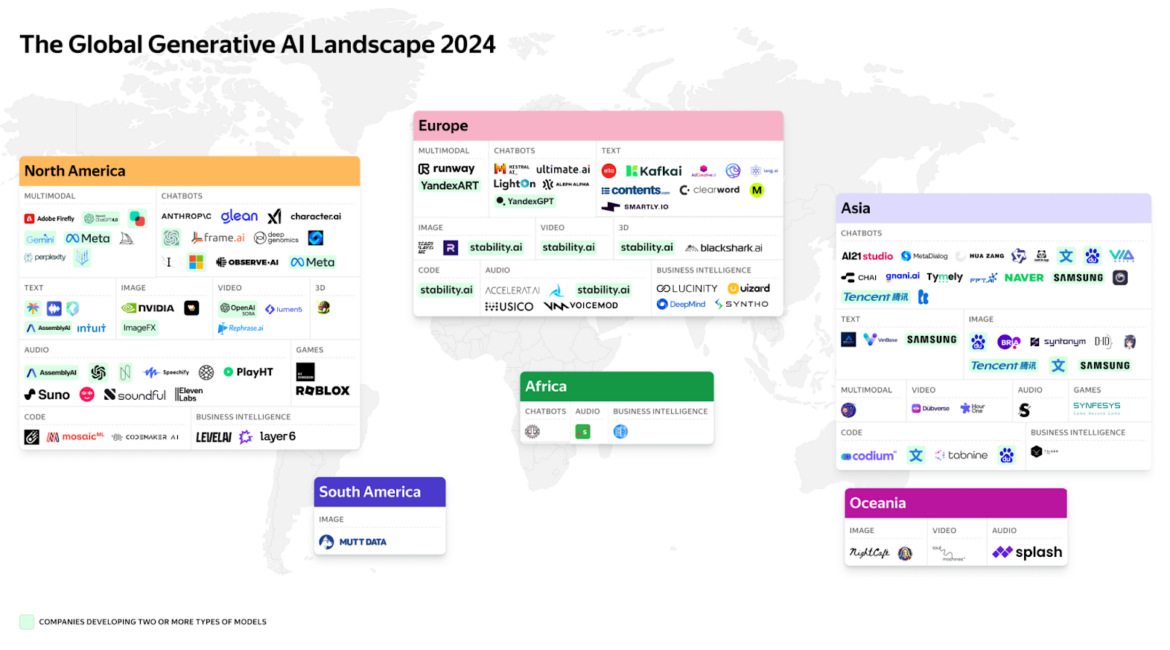AIport, an online community dedicated to covering the latest international ML developments, has crafted the first volume of its Global Generative AI Landscape 2024. This initial edition examines notable GenAI players worldwide across several key categories. This is the first generative AI landscape analysis to emphasize regional attributes and encompass four times more nations than the average GenAI landscape available to the public.
The research process involved examining all 62 countries invested in the AI market, as featured in the Global AI Index by Tortoise. In-house model developers were identified, filtered by the team of editors and data scientists, and subsequently cross-referenced with current GenAI landscapes from Sequoia Capital, Antler, Base10, and others, before being segmented into ten GenAI categories. As the final step, the data was divided into continental regions: North America, South America, Europe, Asia, Oceania, and Africa.
The first volume of the global GenAI landscape from AIport aims to present a balanced view of international companies, encompassing not only Western firms, but also those from other regions. The landscape offers a comprehensive analysis, detailing which players are developing GenAI solutions, their locations, and the specific nature of their contributions. It contains a total of 128 generative models from 107 companies.
As Avi Chawla, a data scientist and community manager at AIport, put it:
“We noticed that many generative AI landscapes tend to focus either on the Silicon Valley giants or the tech powerhouses of Europe, covering no more than 10 countries on average. While this approach does serve its purpose, it can’t really offer a complete picture. To address this, we decided to dig deeper, and this is what we came up with after weeks of research. We believe Volume 1 of our Global Generative AI Landscape 2024 provides an objectively international outlook. And we’re also planning to delve into other aspects of GenAI more closely in the future.”
• Of the 62 countries listed in the Global AI Index, only 35 develop their GenAI solutions in-house. Roughly 90% of them focus on one model type.
• Regional leaders by the number of active GenAI companies are North America – USA; South America – Argentina; Europe – UK and France; Asia – China and Israel; Oceania – Australia and New Zealand; Africa – South Africa.
• The average number of GenAI models per company is the highest in North America, being the only region to have at least one model from each of the 10 model categories.
• Approximately 10% of all companies covered in the study have implemented multimodality in their GenAI models, with a majority of these developers located in the US. This indicates that while multimodality represents an emerging trend, its adoption outside North America still remains in the nascent stages.
• A total of 11 companies worldwide have developed more than one type of GenAI model. Stability AI leads with five distinct GenAI model types (image, video, audio, 3D, and code), followed closely by OpenAI (chatbot, audio, video, and multimodal) and Google (text, image, audio, and multimodal) – both with four model types.
• Microsoft, Meta, Tencent, Baidu, and Yandex are among those companies that developed between two to three types of distinct GenAI models.
• 13 companies have developed multiple models within a single GenAI category. AssemblyAI has two speech-to-text models, MosaicML offers two iterations of its MPT for code generation, while IPOXCap has introduced two chatbots designed for business intelligence applications.
AIport is an online community of AI writers, researchers, and data scientists that aims to provide a transnational perspective on AI. Recognizing that most ML-related publications primarily focus on the “big leagues” in the West, AIport seeks to be more inclusive by widening the angle and broadening the narrative. This approach ensures a more diverse and impartial representation, offering a well-rounded take to the global AI community.





